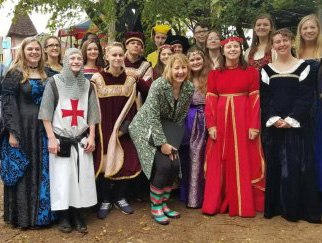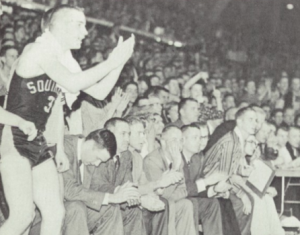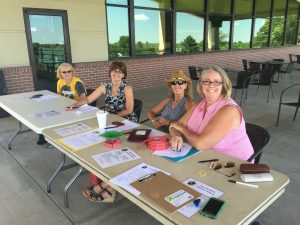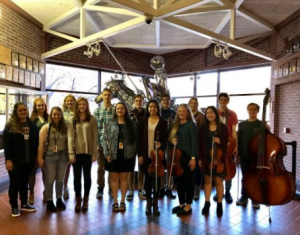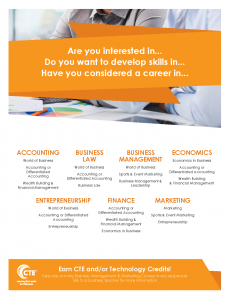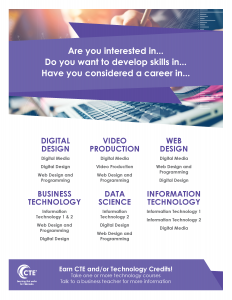Business
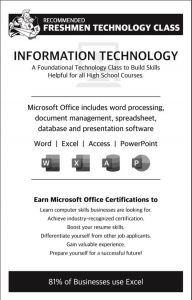
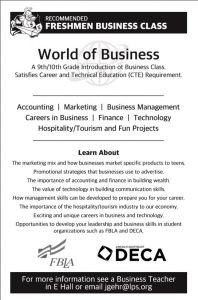
BUSINESS EDUCATION AND TECHNOLOGY – Many exciting choices meet Career and Technical Education requirements. The best introductory business class for 9th or 10th-grade students is World of Business. The best choice for a 9th-grade student to meet the technology requirement is Information Technology.
We have many other courses to guide students in exploring economics, finance, marketing, and management that will prepare them for adult life, employment, college, or a career in business including Marketing, Business Management, Entrepreneurship, Wealth-Building, Financial Management, Digital Design, Video Production, Accounting, and Business Economics. Our computer courses are listed under Technology Computer Education.
Business classes offer a wide variety of courses for students interested in obtaining life skills and careers in business administration, marketing, entrepreneurship, management, and finance. Business technology classes engage students in technology applications to develop skills with word processing, spreadsheets and database, and provide students an opportunity to obtain Microsoft Office Specialist national certification at no charge. Courses in digital media, graphics, web page design, and programming are also offered with advanced study continued at The Career Academy. Business courses are able to provide graduation requirements in the areas of Career and Technical Education, Economics, Technology and elective credit. College Personal Finance, College Accounting, and courses at The Career Academy offer post-secondary dual credit. Students attending The Career Academy will also complete the national High School of Business program and receive certification that can be transferred to post-secondary institutions.
Middle level business and technology courses develop skills in keyboarding, digital citizenship, and electronic file management as well as basic word processing and spreadsheet applications. Business 8 develops personal finance skills and explores business careers. Computer 8 develops digital media skills for personal and professional use.
CTE
LPS Career and Technical Education (CTE) builds a foundation of academic and technical skills so that students are aware of the diversity of career options available to them as they begin to prepare for post-secondary education or entry into entrepreneurship/employment to achieve their career goals. CTE prepares all students for life by:
- Learning through academic and technical skill development
- Earning as productive citizens in a global society, and
- Living as a contributing member of their community
LPS-CTE offers rigorous and relevant courses within career pathways (see LPS-CTE Planning Guide) as defined by the Nebraska Career Education model. Extended learning opportunities are provided through career student organizations and business and industry partnerships. Career and Technical Education is delivered through a variety of programs of study at each of our comprehensive high schools in the areas of Business/Technology/ Family and Consumer Sciences, Health Sciences, Skilled and Technical Science and Work Experience. Specific course listings can be found under each discipline area. Students from all high schools can also continue their study at The Career Academy for advanced courses, dual credit opportunities, and additional programs.
The Career and Technical Education (CTE) Planning Guide is intended to give some guidance and direction to students, parents, counselors and schools in selection of appropriate CTE courses in alignment with a student’s career field of interest. The guide also helps to identify foundational courses and additional courses at the high schools or at The Career Academy. Students generally earn CTE concentration status by taking at least 3 courses in a career field area at their high school or at The Career Academy. The CTE Planning Guide is based on national and state education models for Career and Technical Education.
CTE Objectives
Career and Technical Education (CTE) instruction requires students to think, make decisions, and apply academic and technical knowledge in real-life simulations. Courses are designed to prepare students to work effectively and productively in a changing workplace and diverse society and to become active family and community members. The areas of Business Education, Family and Consumer Sciences, and Industrial Technology offer different courses but have similar purpose and focus. The following statements represent the knowledge, skills, and attitudes typically included in CTE courses in the Lincoln Public Schools.
- WORK HABITS AND ETHICS
Students will develop appropriate work habits, demonstrate initiative, and practice ethical principles in personal, school, and business settings. - DECISION, MANAGEMENT, AND PROBLEM-SOLVING SKILLS
Students will problem solve, make decisions, and manage the use of time, money, materials, space, and human resources. - INTERPERSONAL AND LEADERSHIP DEVELOPMENT
Students will be able to communicate and work productively with diverse people and demonstrate development of leadership skills in multiple settings. - TECHNICAL KNOWLEDGE AND PROCESS
Students will learn and demonstrate technical skills, processes, and procedures. - APPLICATION OF ACADEMIC AND TECHNICAL SKILLS
Students will integrate academic and technical knowledge and implement decisions about personal work, and societal problems and issues. - PRODUCTS AND SERVICES
Students will create, demonstrate, and evaluate useful/or marketable produces and/or services. - WORKPLACE EXPERIENCES OR SIMULATION
Students will experience workplace learnings in simulated classroom experiences and/or at a work site. - LIFE AND CAREER DEVELOPMENT
Students will develop strategies for lifelong learning, viable career choices, and responsible family, school, and community membership.
Work Experience
The Lincoln Public Schools Work Experience program provides an opportunity for students to be employed and receive school credit for learning from a satisfactory job performance. Work Experience helps develop a positive attitude and promote an understanding of the relationship between formal education and job success through supervised, part time employment as part of the students’ total school program. The Work Experience program helps young people attain the skills and knowledge required in the work place of today and tomorrow and to transition from school to careers.
Students must have learned basic skills on their educational journey in order to be able to get a job and be a successful employee. On the other hand, many skills are learned on the job that are usually not taught in school. The Work Experience program is one that extends the classroom into the community, establishing a partnership with the business community that promotes the total educational development of the student.
Students may use the Work Experience program for opportunities that include resume enhancement, career exploration, improving employment skills, and early graduation or credit recovery.



